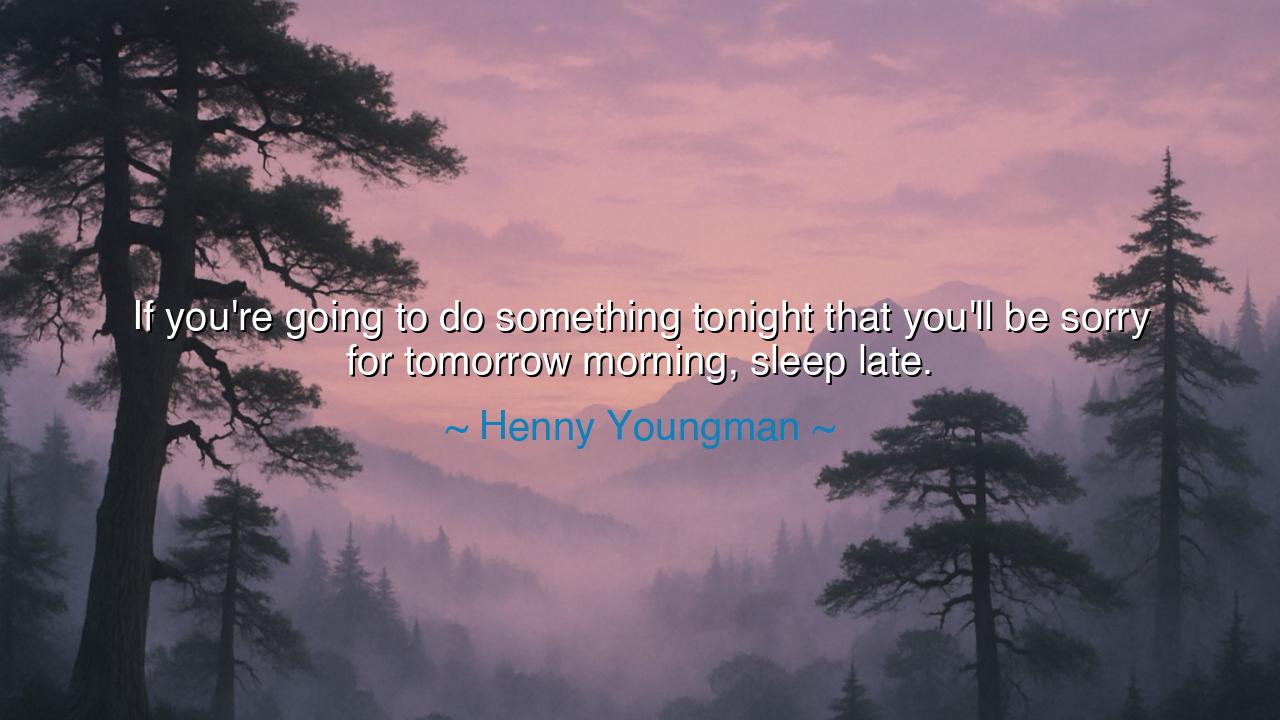
If you're going to do something tonight that you'll be sorry for
If you're going to do something tonight that you'll be sorry for tomorrow morning, sleep late.






"If you're going to do something tonight that you'll be sorry for tomorrow morning, sleep late." – Henny Youngman
In the grand theater of human experience, where choices are made and consequences follow, there exists a powerful truth: the decisions we make in the heat of the moment often lead us into regret when the morning light rises. The words of Henny Youngman speak to the folly of impulsive actions, urging us to recognize that sometimes the wisest choice is not to act at all, but to pause and allow the passion of the moment to fade. When we stand at the crossroads of temptation, Youngman’s advice is both humorous and profound: if the path ahead promises regret, then perhaps the best course of action is to rest, to delay, and let time reveal the clarity that impulsivity often obscures.
In ancient times, the great philosophers often pondered the nature of impulse and reason. Socrates himself was keen to remind his followers that the unexamined life—one driven by unchecked desire and impulsive decisions—was not worth living. Just as he famously encouraged his disciples to engage in self-reflection, so too does Youngman’s wit offer us a playful yet serious call to consider whether the choices we make in the heat of desire will serve us well in the light of reason. The ancients understood that to live wisely was to master the self, to temper our passions with reflection, and to recognize the value of rest as a form of gaining clarity.
Consider the story of Alexander the Great, whose boundless ambition and impulse to conquer often led him to make decisions that were more driven by momentary glory than long-term wisdom. One such moment came after his conquest of the Persian Empire, when, in the heat of celebration, he took actions that alienated his followers and sowed seeds of dissension in his ranks. In hindsight, Alexander would likely have seen that in those moments of indulgence, the glory of the moment did not lead to greater empire or peace, but to instability. His story, like Youngman’s jest, offers a lesson: in the face of temptation, sometimes the best choice is simply to pause, reflect, and allow the moment to pass before committing to an irreversible action.
In the context of self-control, the ancient Stoics, such as Epictetus, taught that true freedom comes not from acting on every desire but from the ability to choose wisely amidst the storm of emotions and impulses. Youngman’s words, wrapped in humor, reflect this very Stoic wisdom. They remind us that we are not slaves to our desires, and that true strength lies not in acting immediately but in taking the time to wait, to allow the rush of emotion to settle, and to act only when we are clear-headed and able to see the long-term consequences of our actions. Like Epictetus, who emphasized the importance of patience, Youngman advocates for rest in the face of poor decisions, offering us the chance to gain control over our choices.
In the modern world, where impulsivity and instant gratification have become the cultural norms, the wisdom of sleeping late—waiting before acting—is especially relevant. Consider the rise of social media, where a single impulsive tweet or post can lead to regret, and the instant gratification of responding to every momentary feeling can have long-lasting consequences. The rush of expressing our opinions without considering the future consequences is a temptation that many fall prey to, much like the ancients who once sought to appease their desires for wealth, fame, or glory. Youngman’s advice, though playful, calls us to pause in these modern moments of instant reaction and wait, as the ancients did, to allow the clouds of emotion to settle and the clarity of reason to rise.
The true wisdom in Youngman’s quote is this: rest is not simply about physical sleep, but about allowing the mind and heart to find peace before making life-changing decisions. When impulse calls, it is often the most difficult, but the most wise, choice to wait, to let time pass, and to come back to the decision with a clearer perspective. It is a reminder that time itself can be a healer, providing us with the space we need to reflect, to ask ourselves what truly aligns with our values and goals. It is through this pause that we protect ourselves from decisions made in haste, ensuring that our actions reflect thoughtful consideration rather than fleeting desire.
In our own lives, let us follow the example of the ancients, the philosophers, and even the humor of Youngman. When we face moments of impulsivity—whether in our relationships, our careers, or our everyday choices—let us learn to recognize when it is best to pause, to rest, and to wait for the clarity that comes with time. By choosing patience, we are not avoiding action, but preparing ourselves for action that will bring wisdom, not regret. Let us sleep late on those nights of temptation, knowing that in the morning, we will be more equipped to face the world with peace, clarity, and a clearer sense of purpose.






AAdministratorAdministrator
Welcome, honored guests. Please leave a comment, we will respond soon